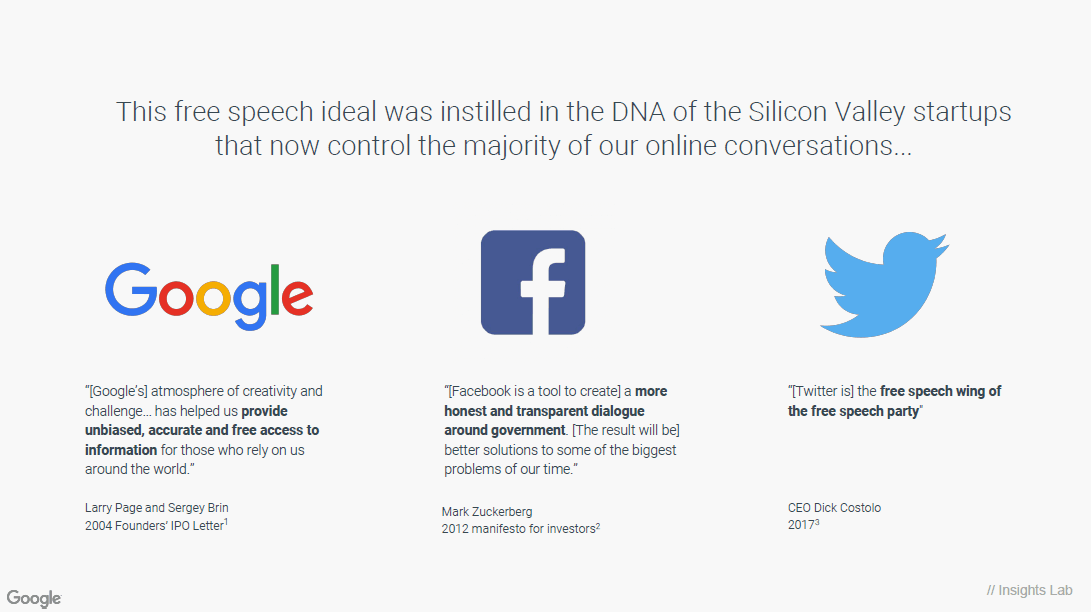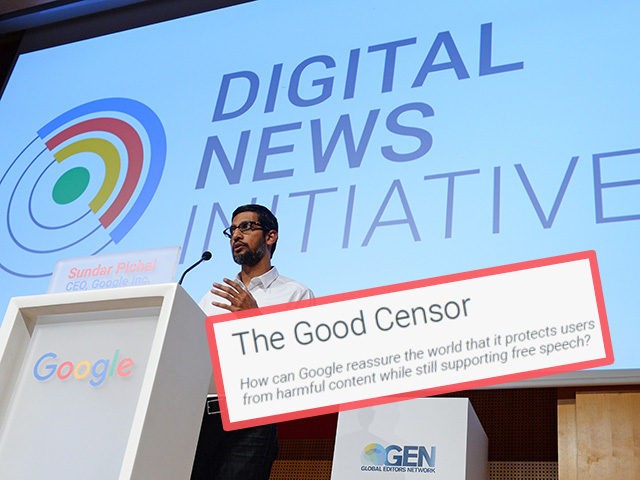Earlier this week, Breitbart News released “The Good Censor,” an 85-page internal company presentation created by Google, explaining in frank terms that the handful of big tech companies that dominate the internet have “shifted towards censorship.” The response from the establishment media? Virtually nothing.
There were a couple notable exceptions. The Daily Mail ran a detailed story about the leak, as did The Hill. And The Verge, part of the far-left Vox Media empire, ran two stories on the leak – although they mostly defended Google’s right to censor in the name of “safety and security.” BuzzFeed’s Charlie Warzel called the leaked presentation “incredibly fascinating” in a social media post, but BuzzFeed itself has thus far failed to cover it.
The conservative media did much better, with coverage in The Western Journal, World Net Daily, LifeSite, Fox News, NewsBusters, and The Daily Wire.
But most of the mainstream “tech media” seems more interested in reviewing Google’s latest smartphone than the company’s candid acknowledgment that the masters of the digital universe have largely abandoned the internet’s founding principles of freedom and openness.
Why the silence? Perhaps they buy Google’s explanation that the presentation was just “research” and doesn’t reflect “official Google positions” — a confusing explanation, as the research is about official Google positions. Is Google disagreeing with its own researchers’ assessment of where the company is headed?
A more likely explanation for the media turning a blind eye to the presentation is that they basically agree with it, and find nothing uncontroversial about its declaration that tech companies have abandoned the “American tradition” of free speech in favor of the “European tradition” of protecting everyone’s feelings.
Here’s how The Verge puts it:
Almost all of us would agree that some restrictions on free speech are necessary. But few of us would agree on what those restrictions should be. Being a good censor — or at least, a more consistent censor — is within Google’s grasp. But being a politically neutral one is probably impossible.
According to the author of the piece, censorship is difficult in practice but still good in theory. What’s more, being a “good censor” is “within Google’s grasp” — even if that censorship isn’t politically neutral.
Harvard’s Nieman Lab, a purportedly respectable institution of establishment journalism, didn’t just ignore The Good Censor — it praised it. Nieman Lab’s piece was gushing in its assessment of the presentation, calling it “insightful and interesting,” going so far as to suggest that Google should have voluntarily made it public.
Why the praise? A clue is in the list of bullet points the Nieman Lab author uses to summarize The Good Censor: at the very top is Google’s distinction between “authoritative sources” and “have-a-go commentators.” Google bemoans that in an environment of total free speech, the opinions of ordinary people can compete with sources like The New York Times on an even playing field. It’s easy to see why the Nieman Lab, a pillar of establishment journalism, would applaud this assessment.
Another reason for the establishment’s decision to ignore, or even praise The Good Censor is because it’s a major problem for a key Democrat narrative on big tech — that Silicon Valley companies don’t censor, and that Republicans’ claims to the contrary are just “conspiracy theories.”
They will certainly find it harder to call it a conspiracy theory, now that Google’s own analysis has contradicted them. But facts don’t carry a high premium in politics, especially in Democratic politics, and they’re likely to continue with that narrative. Democratic politicians have long been talking out of both sides of their mouth on the issue — simultaneously calling allegations of social media censorship a “conspiracy theory” while defending tech companies’ right to censor.
This Democrat-media silent treatment hasn’t worked in the past, and it won’t work now. Even before The Good Censor was released, Pew surveys showed that 72 percent of Americans (including a majority of Democratic voters!) believe that tech platforms “intentionally censor political views points.” Democrat politicians may have stuck their heads in the sand on this issue, but the everyday Americans who vote for them are at least smart enough not to believe everything they say.
What ordinary Americans long suspected, The Good Censor has proven beyond doubt. According to Google’s own analysis, tech companies have performed perhaps the greatest bait-and-switch in American history, promising their users free speech while they were taking over the market, only to go back on their word once they came to “control the majority of online conversations.”

Despite the media blackout, the message is spreading. The Good Censor has been viewed over 650,000 times since it was released earlier this week. Consumers know that initial promise of the internet, of maximal freedom and endless choice, has been taken away from them — robbed by a Silicon Valley oligopoly of limitless resources and uniform values. For ordinary Americans, there is now only one question — what are they going to do about it?
Read The Good Censor in full below:
The Good Censor – GOOGLE LEAK by on Scribd
Allum Bokhari is the senior technology correspondent at Breitbart News. You can follow him on Twitter, Gab.ai and add him on Facebook. Email tips and suggestions to allumbokhari@protonmail.com.

COMMENTS
Please let us know if you're having issues with commenting.